#Black feminist language is to white queers what MLK’s I have a dream speech is to white US Americans
Text
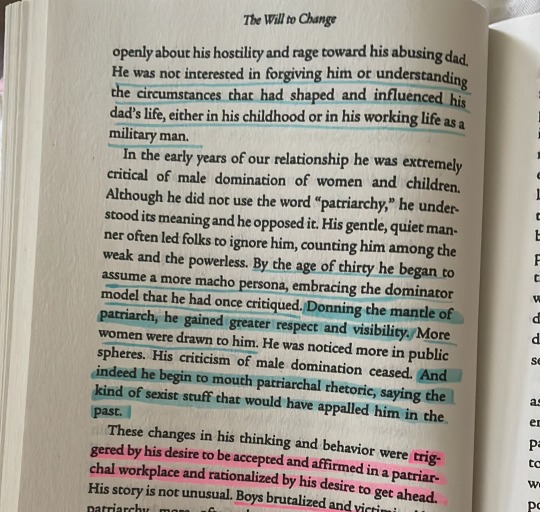
[Image ID: a cropped image of an excerpt from “The Will to Change” by bell hooks. Various spots are highlighted in different colors. Beginning from the first full sentence, the paragraph reads, “He was not interested in forgiving him or understanding the circumstances that had shaped and influenced his dad’s life, either in his childhood or in his working life as a military man.” The following paragraph reads, “In the early years of our relationship he was extremely critical of male domination of women and children. Although he did not use the word ‘patriarchy,’ he understood its meaning and he opposed it. His gentle, quiet manner often led folks to ignore him, counting him among the weak and the powerless. By the age of thirty he began to assume a more macho persona, embracing the dominator model that he had once critiqued. Donning the mantle of patriarch, he gained greater respect and visibility. More women were drawn to him. He was noticed more in public spheres. His criticism of male domination ceased. And indeed he begin to mouth patriarchal rhetoric, saying the kind of sexist stuff that would have appalled him in the past.” The last paragraph is cut off, the top which is visible reads, “These changes in his thinking and behavior were triggered by his desire to be accepted and affirmed in a patriarchal workplace and rationalized by his desire to get ahead. His story is not unusual.” End image ID]
Trans mascs that “speak out” against transandrophobia/anti-transmasculinity/transmisandry/antimasculism/whatever word of the month they’ve forced us to coin, I need you to see yourself in this. This is you. This is you leaning into the patriarchal role of “protectors of the poor weak permanently victimized women,” this is you leaning into the patriarchal role of “ignore your pain, ignore your emotional distress, ignore your psychological needs, stuff it deep down inside and suck it up.” This is you enforcing patriarchal (and therefore also white supremacist) attitudes about gender. This is you learning to shift how you operate under the “logic” of a white supremacist, capitalist patriarchal system so that you can get and maintain access to what little scraps of privilege the system will give you for your conformity.
You cannot apply “logic” to oppressions—it is not a math equation you can solve for. It is not internally consistent.
(And when I say logic, I mean formal logic, I mean mathematical logic, I mean specifically Western conceptualizations of logic.)
You can’t simply state that “men don’t face oppression for being men because that then logically means [something untrue about women’s oppression] would be the case and it’s not.” Oppression is inherently illogical. To assume it operates on a truly definable and fully understandable logic is to suggest there’s a “good” reason for its existence. Which if you examine that for just a moment, you find it also then suggests that there is truth behind how oppression works. Or rather, that oppressed people did some thing or are some way that deserves oppression in response.
White supremacy doesn’t operate on any logical basis. Patriarchy doesn’t operate on any logical basis. They weren’t constructed to be logical, they were hardly “constructed” at all. They came about specifically to uphold and maintain powerful people’s access to power. To call the systems “constructed” is almost to give people too much credit.
Perhaps at one point “white supremacy” was a very specific spark in the mind of quite a number of powerful fair skinned Western Europeans, (though many would understandably point out that white supremacy existed well before it was made explicit), but to suggest that white supremacy as it exists now, as a self-perpetuating system that is able to chug away, an engine for capitalism built and sustained on the exploitation and slaveability of Black bodies, was consciously and carefully designed to operate only within specific bounds that we can define and uncover? That’s trying to use the master’s tools to dismantle the master’s house.
Trying to equate the operation of white supremacy with patriarchy, or any system of oppression with any other system of oppression (though you really do see this most often with people equating racism with sexism) similarly does not work because they are not organized logically. They are not separable entities, either. It is true that there are common elements to different oppressions (see: Suzanne Pharr, bell hooks, Paulo Freire) and it is true that the different systems are interlocked and work together to hold it all up (see: Audre Lorde, Patricia Hill Collins, Andrea Smith) and it is true that they impact people at different intersections of oppressive systems uniquely and dynamically (see: Kimberlé Crenshaw, Jennifer Nash, Bonnie Thornton Dill & Ruth Enid Zambrana) and the systems themselves intersect and interact in different ways to produce unique effects which are dynamic across time and space and context (see: Cathy J. Cohen, Patricia Hill Collins, Rita Kaur Dhamoon).
At the end of the day, too, this whole conversation is also excruciatingly Western-centric, and most often Americentric. The white trans mascs (and any other white queers) decrying the concept that men could ever be oppressed for their being men, that men’s experiences of oppression could ever be shaped by their manhood (or their proximity to it), betray their ignorance to men’s experiences outside of their specific version of Western patriarchy. It betrays their understanding of patriarchy, white supremacy, and feminism as having been wholly informed by white radical feminists who appropriate the language of Black feminism while maintaining essentialist perspectives that reify and protect the same patriarchy they want to critique. As though patriarchy is just about men holding power over women and not also about men holding power over other men, not also about women’s complicity in maintaining and perpetuating it, not also about Western nations holding power over the Global South, not also about kinship organization, not about nationalism, not about colonialism, not about international and transnational politics, not about capitalist globalization.
I suppose this turned into something much bigger than it was originally meant to be, but I have fucking had it. I am fed up with white trans mascs from Western countries whose understanding of feminism is stalled at the stage where they’ve learned that white neoliberal feminism is bad because it’s not anticapitalist or intersectional enough but they haven’t actually learned what the fuck that criticism means because they think or behave as though “intersectional” is just another word for “diverse,” which they also maintain a neoliberal understanding of. I am also fucking heartbroken for all the trans mascs who are willing to lean into this patriarchal role where they close off their own emotions and dismiss their own problems and downplay the reality of being a transgender person at their particular intersection all because they’ve been convinced that men’s problems aren’t real problems, that the oppression they experience because they are transmasculine people is nothing to do with their masculinity or association with or proximity to (and subsequent distance from) manhood.
To claim that there is nothing unique about transmasculine experiences of oppression at the intersection of trans identity and gender is to willfully ignore reality in quite the same way that transphobes do when what they protest is “trans ideology.” Trans people will exist whether you personally believe our gender claims or not, right? So to fail to incorporate us into your reality is to have the temper tantrum of a toddler all because the world and its people aren’t as simple and uniform as you wanted them to be. Similarly, transmasculine people will experience oppression at this intersection regardless of what you want to call it, but to demand that we capitulate to language that flattens our experiences along the lines of either being transgender (it’s literally just transphobia) or our proximity to womanhood (it’s literally just misogyny), or even the two together but-not-really (it’s transphobia and misogyny but it’s not because of your proximity to manhood), is to suggest that there is nothing unique about our experiences of transphobia and misogyny as transmasculine people. Is to suggest that unless and until we are perceived as men by society, our experiences with oppression and penalization (and privilege by this logic, but notably not in practice) are indistinguishable from those of cisgender women and there is no value in discussing, dissecting, naming, or otherwise acknowledging anything transmasculine people experience—and then on the flip side, when society does perceive us as men, suddenly our experiences with oppression and penalization (and privilege by this logic, but notably not in practice) are indistinguishable from those of cisgender men, and so there is no value in discussing, dissecting, naming, or otherwise acknowledging anything transmasculine people experience.
We’re either basically cis women or basically cis men, whichever is more convenient and makes it easier to disregard us in the moment.
#transandrophobia#anti transmasculinity#transmisandry#it doesn’t fucking matter what you want to call it they’ll say it’s discourse anyway#contributions to theory#self ID purposes here I am a white transmasc in the US#this post is definitely US centric or Western centric but like that’s largely intentional this time around#Black feminist language is to white queers what MLK’s I have a dream speech is to white US Americans#like idk maybe actually engage with it on its original terms before you start putting it in your own fucking mouth
35 notes
·
View notes
Text
What is Critical Race Theory (CRT)?
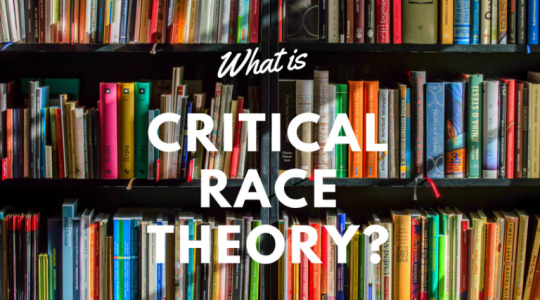
Critical Race Theory (CRT) is a framework for analyzing (as well as changing) the realities of race and racism in society. A way of critically looking at race relations today.
Like Critical Pedagogy, CRT is not a thing in and of itself. CRT continues to inspire and inform Critical Pedagogy and critical educational discourse.
CRT is set of lenses (tenets) we can use as critical educators to check ourselves and look at the policies, stories, curricula, and other narratives around us and our students.
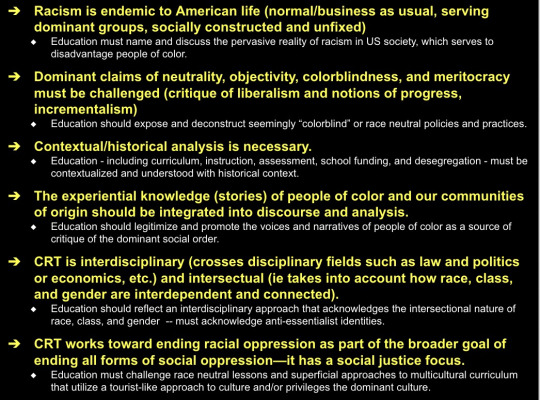
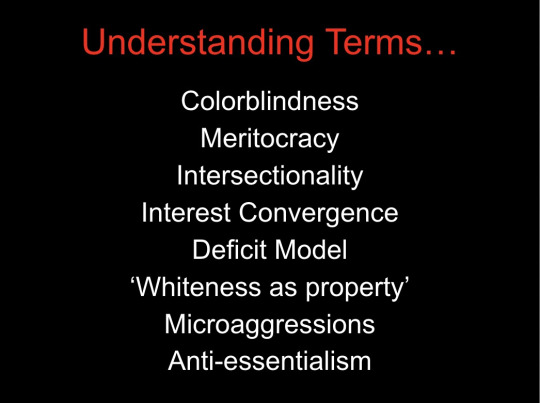
Colorblindness
Inspired by MLK ‘I have a dream speech’ - but altered meaning to focus on not seeing difference, rather than original intention/reference towards equality.
Allows you to avoid talking about race, a form of denial (‘ostrich in the sand’), but in the meanwhile Whites face reverse racism.
Connected to differences between Equity and Equality - equal resources do not help equal the systems in place that disadvantage unequally
Does not address inequity directly
Children are aware of racial difference, adults must address but often avoid
Teachers talk of ‘Fear of…’ reinforcing stereotypes, mis-stating, pity, etc.
Seeming neutrality
“The normalization of whiteness produces the coloblind ideology.” (Dipti Desai)
See: CRT Chapter, p. 26; Gloria Ladson Billings, p. 29; Racial Awareness, p. 2-4
Whiteness as property
bell hooks addresses intersection of race and gender, rape as assertion of dominance/dominion “racism and sexism are interlocking systems of domination which uphold and sustain one another” hooks, Race and Sex, p. 59
US was conceived and built on notion of property - connected to citizenship (who could vote, and who could not)
Whiteness connected to privileges - financial benefits and invisible/unearned privileges
Reproduced within structures of capitalism: based on originary system of chattel slavery and violent colonial disposession of indigenous land (bc they did not believe in notion of property/ownership of land), continues through more recent systems of disenfranchisement: Black codes, Redlining, legal definitions of whiteness (Dred Scot, Plessy v. Ferguson)
“Whites know they possess a property that people of color do not and that to possess it confers aspects of citizenship not available to others. Harris’s (1993) argument that the ‘property functions of whiteness’ (p. 1731) - rights of disposition, rights to use and enjoyment, reputation and status property, and the absolute right to exclude - make the American dream of ‘life, liberty, and the pursuit of happiness’ a more likely and attainable reality for Whites as citizens.” -- Ladson Billings, p. 26
Explains the expanding wealth gap.
See: Gloria Ladson Billings p. 25-26; Cameron Rowland, 91020000;
Meritocracy (Yuanyuan)
Similar to colorblindness, meritocracy is known as a political effort admitting individual efforts, talents and achievements towards equality regardless of one’s social class and race, aiming to deconstruct oppressive racial structures and reconstruct equitable and socially just relations of power in schools.
Meritocracy creates socioeconomic disparity, which directly affects the distribution of resources and quality of education.
It is closely correlated with high-standard entrance exams/placements, which is dominant by most financially rich and socially powerful elites and aggravates social and financial segregation. -Segregation Has Been the Story of New York City’s Schools for 50 Years, New York Times
Embedded with individual equality, the practice highlights the efforts of individuals, but fails to recognize the function of social, historical, or institutional process. (Ladson-Billings)
Meritocracy doesn’t practically resolve social/political/racial inequality with the existence of “bipartisan support for the privatization of school through charters and vouchers, and high suspension and expulsion rates for Black and Latina/o students at schools”.- Seneca Falls, Selma, Stonewall, Moving beyond Equality. P31-p32
Meritocracy remains dominated by the power structures, as Angela Davis states, “policies of enlightenment by themselves do not necessarily lead to radical transformation of power structures.”
Intersectionality (Alexis)
Recognizing the interconnectedness of social justice movements. It is also a way to recognize people and their identities as complex. Intersectionality does not hold one social justice cause above another, but rather recognizes the link of oppression under systemic constructs. For example, in 1972 the Gay Sunshine: A Newspaper of Gay Liberation published an article called We Are All Fugitives that, “Visually connected queer struggles with anti-prison, anti-colonial, feminist, Black Power and other liberation movements” (Quinn and Meiners P. 30). bell hooks says, “Black liberation struggle must be re-visioned so that it is no longer equated with maleness. We need a revolutionary vision of black liberation, one that emerges from a feminist standpoint and addresses the collective plight of black people.” She’s saying that with out a feminist framework applied to black liberation, the efforts will disproportionatley aid black men and not women. It is the intersection of black liberation and feminism that is necessary for progress.
“There is no such thing as a single-issue struggle because we do not lead single-issue lives.” Audre Lorde
Interest Convergence (Sarah W)
Some CRT scholars suggest “interest convergence” in response to contention that civil rights laws serve the interests of whites
Defined as “the place where the interests of whites and people of color intersect“ (Ladson-Billings).
Example of Martin Luther King Jr. Holiday commemoration in Arizona:
State of Arizona originally deemed MLK Jr Day too costly and wouldn’t recognize the holiday for state workers and agencies. African American groups and supporters began boycotting. When the NBA and NFL suggested high profile games not be played in Arizona, the decision was reversed. When the position on the holiday could have negative effects on tourism and sport entertainment venues, state interests converged with the interests of African-American community
“Converging interests, not support of civil rights, led to the reversal of the state’s position” (Ladson-Billings).
Deficit Model (Sarah S)
Focuses on students’ weaknesses
“Critical Race Theory suggests that current instructional strategies presume that African American students are deficient. As a consequence, classroom teachers are engaged in a never-ending quest for “the right strategy or technique” to deal with “at-risk” students.” African American students thus are addressed in a language and manner denoting failure and are often involved in some sort of remediation. When using a set of teaching techniques, the students instead of the techniques are found to be lacking. (Ladson-Billings)
Children are aware of racial differences as well as racism and begin picking apart societal negatives (or weaknesses) which apply to themselves at a young age (Derman-Sparks et al.)
Microaggressions (Zack)
Microaggression is a term used for brief and commonplace daily verbal, behavioral, or environmental indignities, whether intentional or unintentional, that communicate hostile, derogatory, or negative prejudicial slights and insults toward any group, particularly culturally marginalized groups. (Sue, Capodilupo, Torino, Bucceri, Holder & Nadal, 2007).
The term racial microaggressions was first proposed by psychiatrist Chester M. Pierce, MD, in the 1970s, but psychologists have significantly amplified the concept in recent years.
From Buzzfeed, here are 15 Microaggressions heard by employees:
1. What are you?
2. So what do you guys speak in Japan? Asian?
3. You don’t act like a normal black person, ‘ya know?
4. Courtney, I never see you as a black girl.
5. So, like, what are you?
6. You don’t speak Spanish?
7. No, you’re white.
8. So, what does your hair look like today?
9. So, you’re Chinese, right?
10. You’re not really Asian.
11. Why is your daughter so white?
12. You’re really pretty for a dark skin girl
13. Can you read this? (A Japanese character)
14. Why do you sound white?
15. Can you see as much as white people? You know, because of your eyes?
Anti-essentialism (Victoria)
Has a lot of connection with intersectionality
“No person has a single, easily stated, unitary identity. A white feminist may also be Jewish or working class or a single mother… An Asian may be a recently arrived Hmong of rural background and unfamiliar with mercantile life or a fourth-generation Chinese with a father who is a university professor and a mother who operates a business. Everyone has potentially conflicting, overlapping identities, loyalties, and allegiances.” (Delgado, Stefancic, 2001)
Not all people of the same race have the same experiences. There’s a wide variety of experiences within one race, and oftentimes we’ll have multiple identities that will overlap or conflict with each other.
Hegemony (Ari)
-Hegemony is the internalization of dominant structures in society
-internal agreeance & submissiveness of power structures, sometimes because of not wanting to face furthur discrimination (example: refraining from using a non-english language in public)
-attempts to deconstruct hegemony is known as “counter-hegemony”
-power structure examples: white person & POC, male & female, thin person or large person, elder (wise) & younger (inexperienced), able bodied person & disabled person
-being hyper-aware of these and allowing them to continue, joining this system of oppression
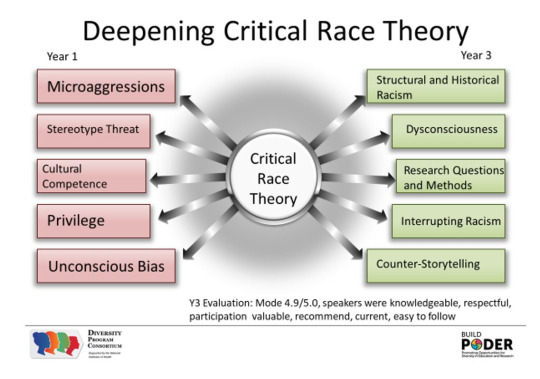
0 notes